One of the most modular subclasses in Dungeons & Dragons 5th Edition is the Totem Warrior Barbarian. Boasting five different animals that adjust the Barbarian’s skillset significantly, choosing the correct Totem Spirt for each level can be fairly difficult at a glance. How useful is each animal at a given level, and which should you choose to bring the most power to your raging hulk?
The Totem Warrior is a Barbarian subclass and, arguably, one of the best. It gets to choose between five different animals at level three, six, and 14. Each of these choices affects a somewhat different aspect of the Barbarian’s gameplan, and the spirits can be mixed and matched to the Barbarian’s content.
The best Totem Spirit options for Totem Warrior Barbarian in 5E
The best Totem Spirits in 5E let the Totem Warrior do what no other subclass can do, and what magic has trouble giving the Barbarian. This means we are going to prioritize raw power, but while keeping in mind that your Barbarian is likely on a team with casters and also has eight other Primal Paths that they could choose from. We want them to feel powerful while also feeling unique.
Level three
At level three, your Animal Spirit influences how you rage. It channels through a totem object and makes for a substantial improvement to your build.
5. Tiger
The Tiger helps you jump while raging—by 10 feet horizontally and three feet vertically. That’s kind of it.
This is a bit of a bummer. If you play BG3, you’d be used to Leap as a powerful bonus action that chops off some movement but replaces it with a big jump that Strength-based characters can use to quickly close gaps.
In 5E, you’d know Jump as a frustrating mechanic that eats your own movement speed, requires a 10-foot head start to be realistic, and can never add extra movement to your speed. This means that the Tiger can set your Long Jump to be around 30 feet, letting you ignore difficult terrain without a problem—and almost anything else.
Even if your DM is addicted to making maps with difficult terrain that slows your walking speed, we still wouldn’t recommend Tiger for your rage.
4. Elk
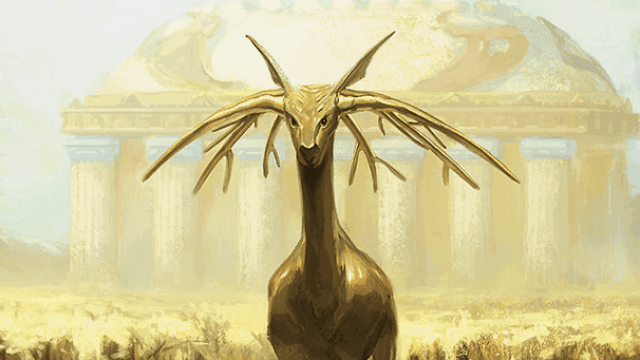
The Elk simply boosts your walking speed by 15 feet. This puts most Barbarians at a default of 45 feet, or 55 feet at level five. That’s 11 squares of movement, which should be enough to close the gap on all but the most elusive foes.
This does not offer as much per-turn movement as Eagle, but gives it to you immediately. So, on your turn, you can rage and almost certainly make it to someone you can throw into a trash can.
That said, Barbarians don’t tend to have much trouble getting to enemies, and those that do can use their free inventory interaction to chuck a javelin. For these reasons, mobility really isn’t that important.
3. Eagle
The Eagle gives the Barbarian the ability to Dash as a bonus action, as well as the ability to take opportunity attacks at disadvantage. This isn’t bad for a Barbarian. By default, this is a class whose only bonus action is to rage. So, giving them Dash as a bonus action seems legitimately strong.
However, Barbarians don’t usually suffer that much due to movement. They suffer due to special movement types that keep them from reaching targets, like flight. And even then, you would have to wait one turn to unlock your bonus action before making use of your Dash, as rage took up that bonus action.
The disadvantage on attacks of opportunity against you is realistically fine, though Barbarians have resistance to those by default. Getting pinged in the back of the head by a Longsword as you sprint to fight the enemy Wizard is annoying but manageable.
Both of these benefits are good, just a bit clunky.
2. Wolf
The Wolf is one of two options that really work for Totem Warrior. The Wolf is the far more aggressive choice, giving advantage to allied melee attacks targeting enemies that are near the Barbarian.
This lets you set up your fellow melee fighters for success, like Monks or Rogues, since it isn’t just a single attack roll. Anybody who is on the frontlines will be very thankful for your ability to buff them. It’s like you’re giving your friends Reckless Attack, provided they stand with you and fight.
If you’re wanting to make your fellow melee fighters shine, while still being a fairly durable fighter, the Wolf is a great choice.
1. Bear
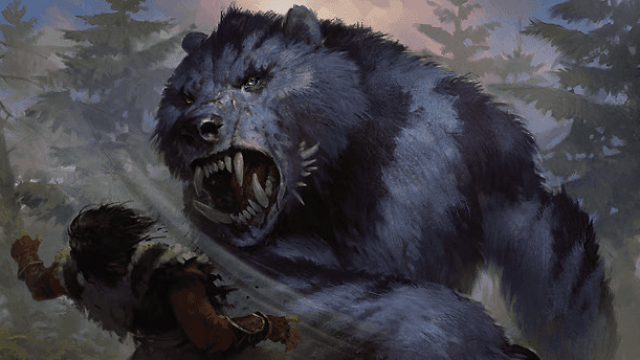
The Bear Totem Spirit grants resistance to all damage, except psychic damage, while you’re enraged. This is a completely busted ability that cannot be usurped by any means.
The Barbarian’s natural weakness is spellcasters. When they enter a rage, a Barbarian can get charbroiled, electrocuted, or poisoned almost as easily as anyone else. While high health pools make them more likely to survive, they often can’t put out enough damage to prevent the enemy Sorcerer from turning them into chopped liver over the course of a few turns.
By entering a Bear rage, Barbarians force magic users to target them with crowd control magic that would be better served decimating allied Clerics or Druids, classes that can so easily shape the battlefield and control enemies themselves.
That’s because a Bear Barbarian doubles their health pool against casters, making them a hard pill to swallow. That Greataxe isn’t going away anytime soon. And, with feats like Mage Slayer or Sentinel, the Barbarian can better cement their place as a battlefield staple that can take turn upon turn of punishment without blinking.
Level six
At level six, the Barbarian gets a permanent benefit that works in and out of rage. You can select a different animal than you took for level three, making it profitable to mix and match. Which is good, because the Bear gets a bit lazy at this point.
5. Wolf
The Wolf grants the Barbarian the ability to move at a fast pace while traveling for the purposes of tracking, and at a normal pace for sneaking.
This is incredibly odd. It doesn’t spread the benefits to other party members, meaning that your party members would have to hoof it at a fast pace too. It also doesn’t actively improve your ability to track or sneak. Barbarians aren’t the worst in the game at Stealth or Survival, mind you. But they’re far from a Ranger.
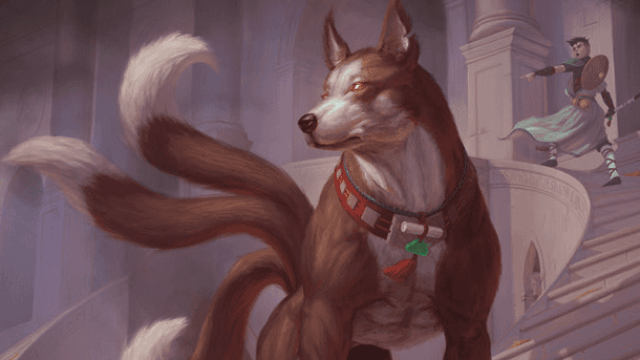
There’s also another benefit on the list that doubles travel speed for actually everyone in the party, including mounts, further making this useless. Why double your speed for only tracking purposes when you can double everyone’s speed all the time?
4. Bear
The Bear is one of the worst options for this out-of-combat benefit, which is fine—it carried the rage portion of the build. Choosing Bear at level six gives the Barbarian doubled carrying capacity and advantage on Strength checks to interact with objects.
This unfortunate casualty is a result of the wide-spread use of the Handy Haversack and Bag of Holding. These items let anyone in your party hold far more than basic carrying capacity otherwise allows, making the Bear’s most prevalent bonus not as great. If you’re ever nearing carrying capacity, you should probably consider making a camp. An 18-Strength Barbarian’s capacity sits around 270, vastly outpacing almost any inventory in the game.
Advantage on Strength checks to interact with objects can come up occasionally. But, if you desperately need to push something out of the way—say it’s an emergency and you need to move a blockade—then magical aid or entering a rage is a much easier way to improve your Strength check than getting a permanent class feature.
3. Elk
The Elk doubles travel speed for the Barbarian and their party, which isn’t bad, but isn’t necessarily required. Interestingly, it also improves the travel speed of mounts, meaning that you can clear a surprising amount of land every day at a fast pace.
Overland travel is not guaranteed to be an important part of any given campaign. Even continent-spanning campaigns only benefit so much from having doubled travel speed. The extra time can be spent crafting, storytelling, or bonding with party members.
That said, this isn’t actually all that bad a choice. Being timely is a great idea, especially in campaigns where the world is in danger. The Elk will get your entire party to a location twice as fast, no magic required. While there are magic solutions that encompass this ability entirely, you don’t always have easy access to Teleportation or Teleportation Circles. This is a good middle ground.
2. Tiger
The Tiger provides two skill proficiencies from Athletics, Acrobatics, Stealth, or Survival. Skills are difficult to effectively powerscale in 5E, but Barbarians are fairly hard-pressed for skills. Athletics, Acrobatics, and Stealth are consistently useful in combat, with several applications for offense and defense. Survival exclusively offers out-of-combat utility, but has a myriad of applications ranging from finding directions to gathering intelligence.
This feature is nice for a Barbarian in a campaign where having skills is important, like survivalist settings. Getting that plus-three to plus-six is impactful and helps you land many more skill checks. However, it’s not the one we’d recommend by default.
1. Eagle
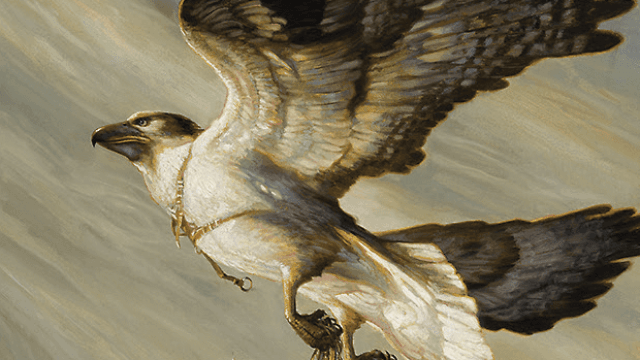
Eagle affects a Barbarian’s vision, allowing them to ignore dim light’s disadvantage on sight-based Perception checks. This improves their passive Perception significantly, since dim light is fairly common in 5E. Fight in the shadows like an Eagle. Y’know, the legendary night-hunters.
More in-tune with the bird’s real-life attributes, you can see a mile away as if it was 100 feet away. This is an incredibly specific ability that you can abuse to no end. Read mission files from enemy camps, spy from a comfortable distance, or even use your sight like a magnifying glass. It requires a bit of DM creativity and player ingenuity to use effectively, but can be fun and surprisingly powerful.
Level 14
The final ability is an extra buff for rages, typically granting about a bonus action’s worth of utility.
5. Wolf
The Wolf allows you to knock something prone as a bonus action after landing a weapon swing, as long as it is Large or smaller.
Prone is an unusual status effect as it gives advantage to melee attacks, but provides disadvantage to ranged attacks. It can also be removed by the target spending half of their movement speed, so the condition doesn’t even negate any actions.
Barbarians don’t need advantage on attacks, since they have Reckless Attack. So, this really only works if the initiative is in your favor and your allies are melee. And if that was the case, then the Wolf Level Three benefit might be more helpful for you.
4. Elk
The Elk is similar to the Wolf, as it lets you knock Large or smaller targets prone as a bonus action. However, the Elk does so by moving through the target’s space, giving them a saving throw, then dealing a d12 plus Strength in damage if it all works.
This is arguably worse than Wolf, since the prone isn’t guaranteed. But, unlike Wolf, you can try this before you swing and not have to worry about Reckless Attack during your turn. You also get more rewards for landing it. 1d12 plus Strength is about 12 average damage for a 20-Strength Barbarian, which is very much acceptable.
Certainly a fun ability, if a bit targeted. BG3 made this an area-of-effect and it still isn’t perfect.
3. Eagle
The Eagle has a fly speed equal to the Barbarian’s walking speed. Usually, this is 40 feet. This should be enough to let the Barbarian fly up, smack a flying Warlock, then safely land.
This isn’t permanent flight, so the Barbarian needs to put on their landing gear if they want to stay healthy. But, falling damage is technically Bludgeoning, so not exactly terrible for you.
This ability is slightly overshadowed by items that give flight more often, like Winged Boots. Those are great magical items for a Barbarian to attune to. But, this fly speed is a fine replacement.
2. Bear
The Bear comes back big at level 14 with the ability to force all creatures within five feet to have disadvantage on attack rolls targeting anyone but you. While you’re enraged, you likely have upwards of 200 to 300 equivalent HP thanks to your resistance. This means hitting you isn’t exactly profitable.
The creatures do have to be right next to you, which is a bit annoying. However, if they try to run, you can at least give them goodbyes with an opportunity attack to the spine. And, with Sentinel, this type of support tank Barbarian can really elicit groans from your DM.
1. Tiger
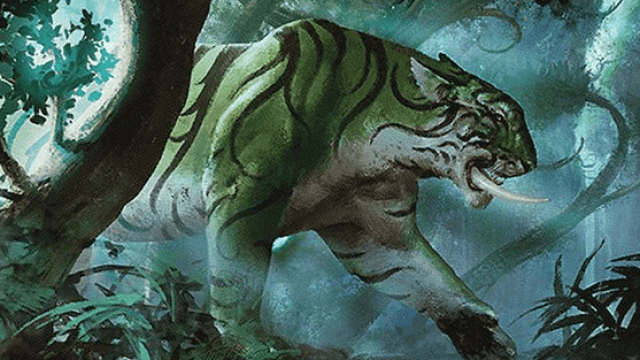
The Tiger lets you swing as a bonus action as you approach a Large or smaller creature. You need a 20 foot straight line to do so. This gives the Barbarian an excellent bonus action to bean their foes with a two-handed weapon.
If the condition seems a bit hard to fulfill, just remember: Barbarians have 40-foot movement speed. You can, if you need damage, run away and then straight back to the target for a bonus swing.
This is an interesting combo with Eagle, which makes taking opportunity attacks less painful. It’s great if your focus is to be a high-damage Barbarian that is entirely concerned with their Axe.


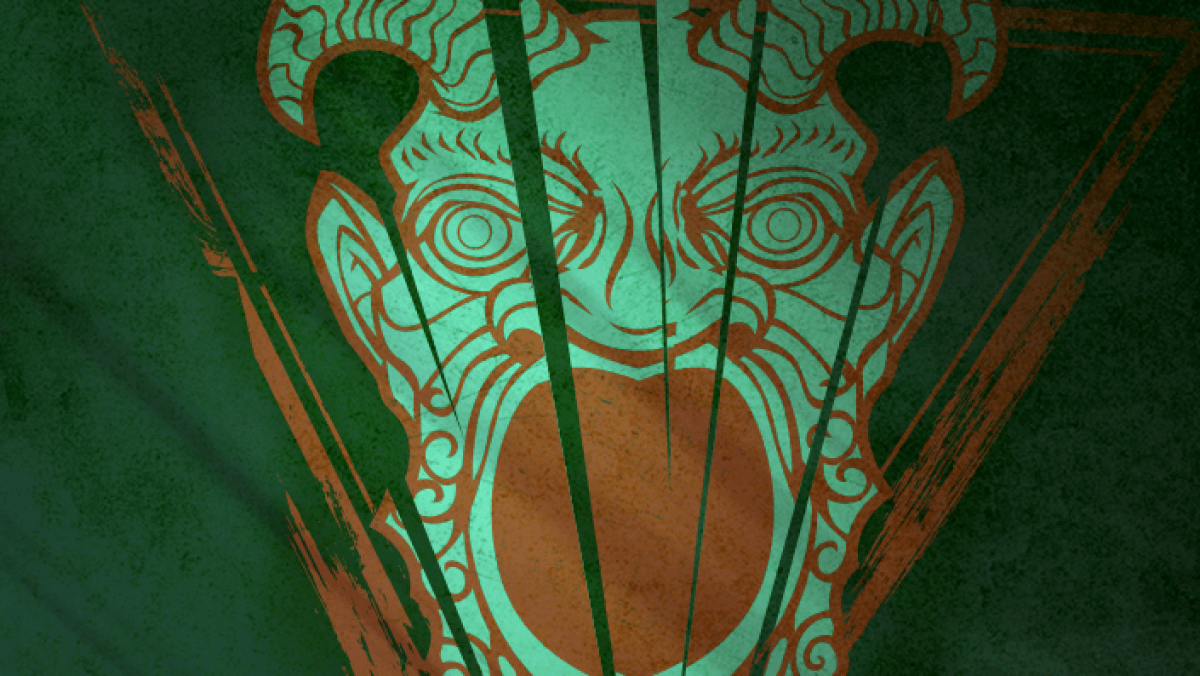

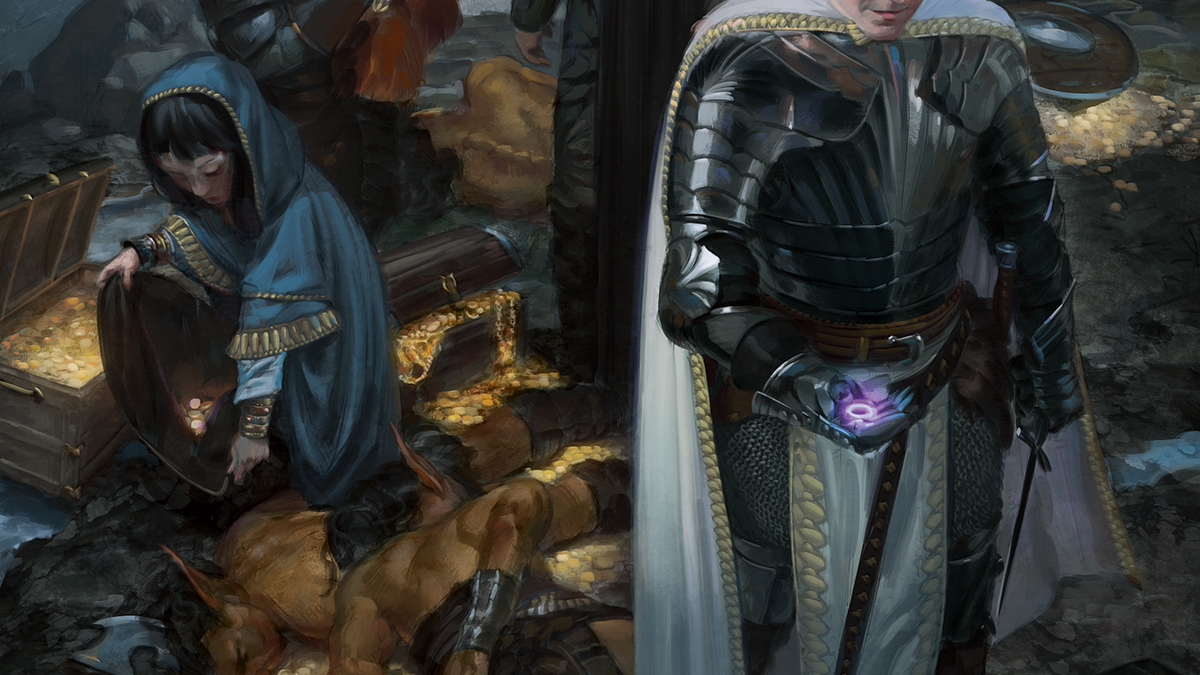
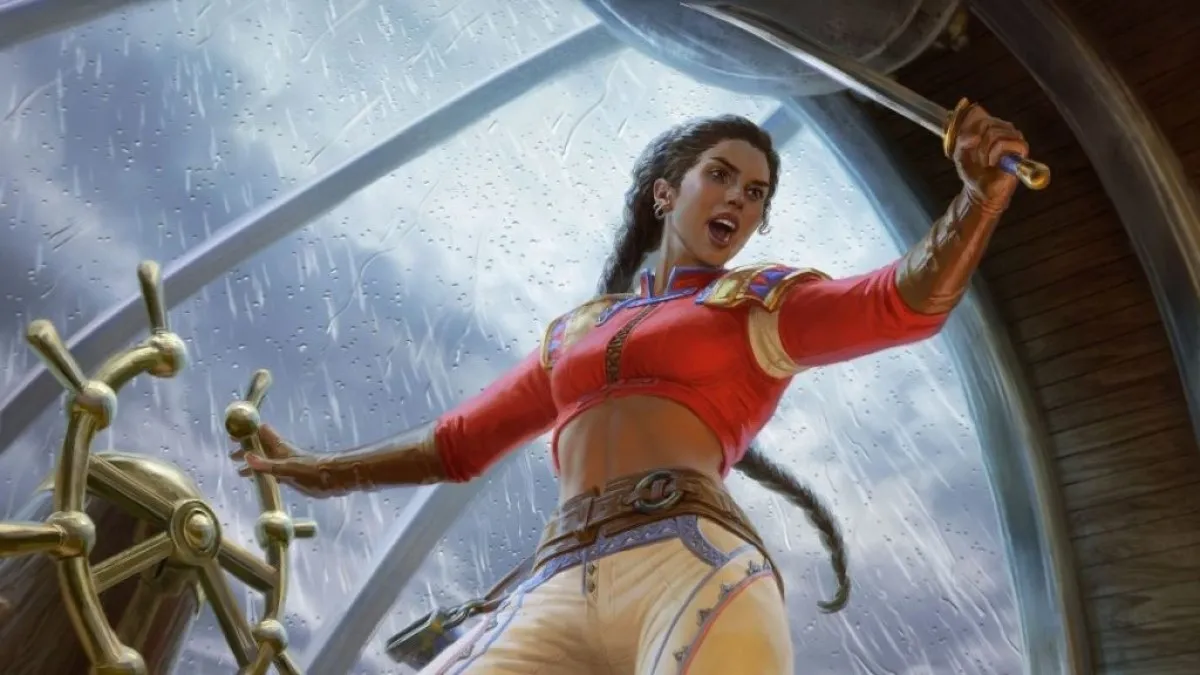
Published: Oct 8, 2023 06:15 am